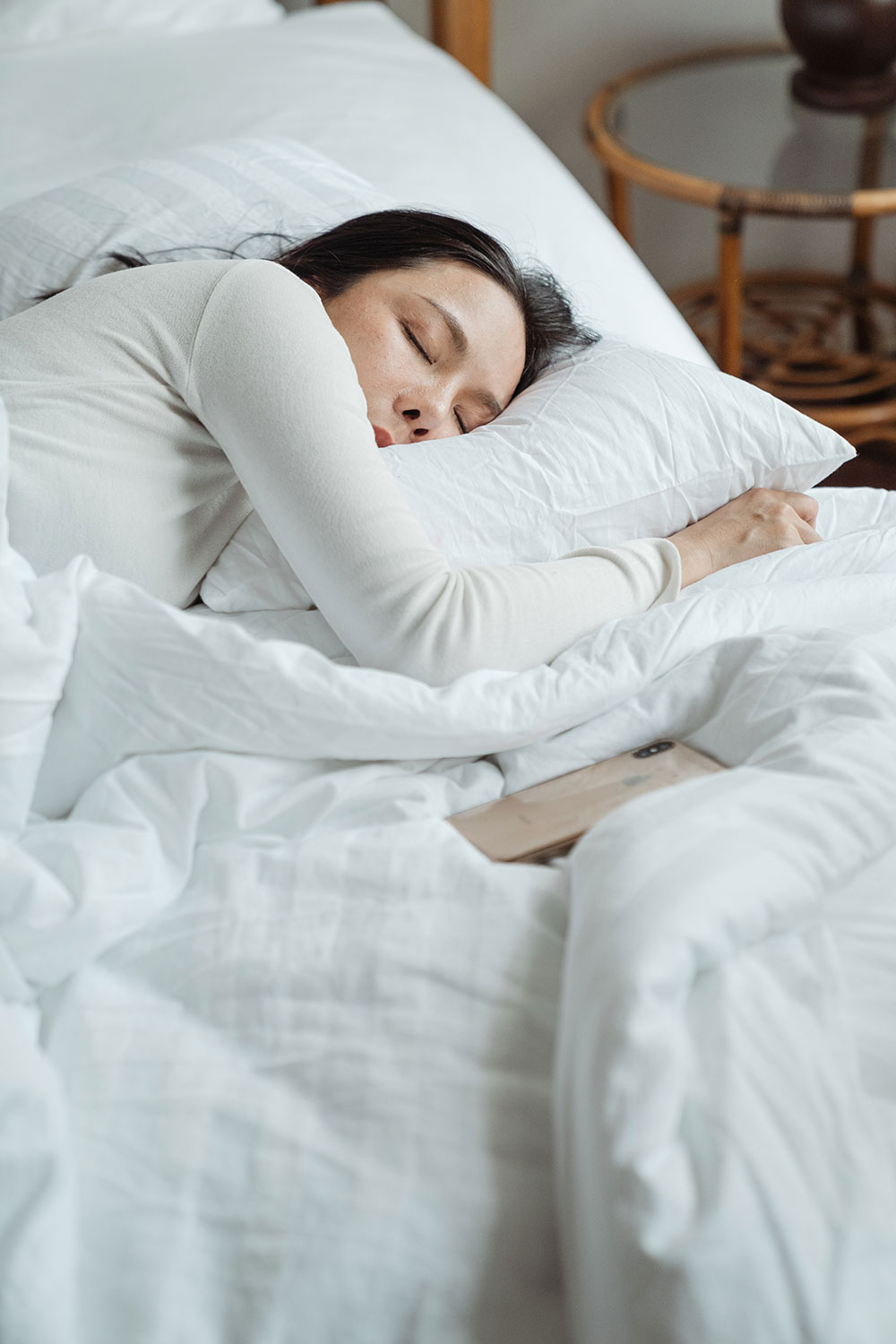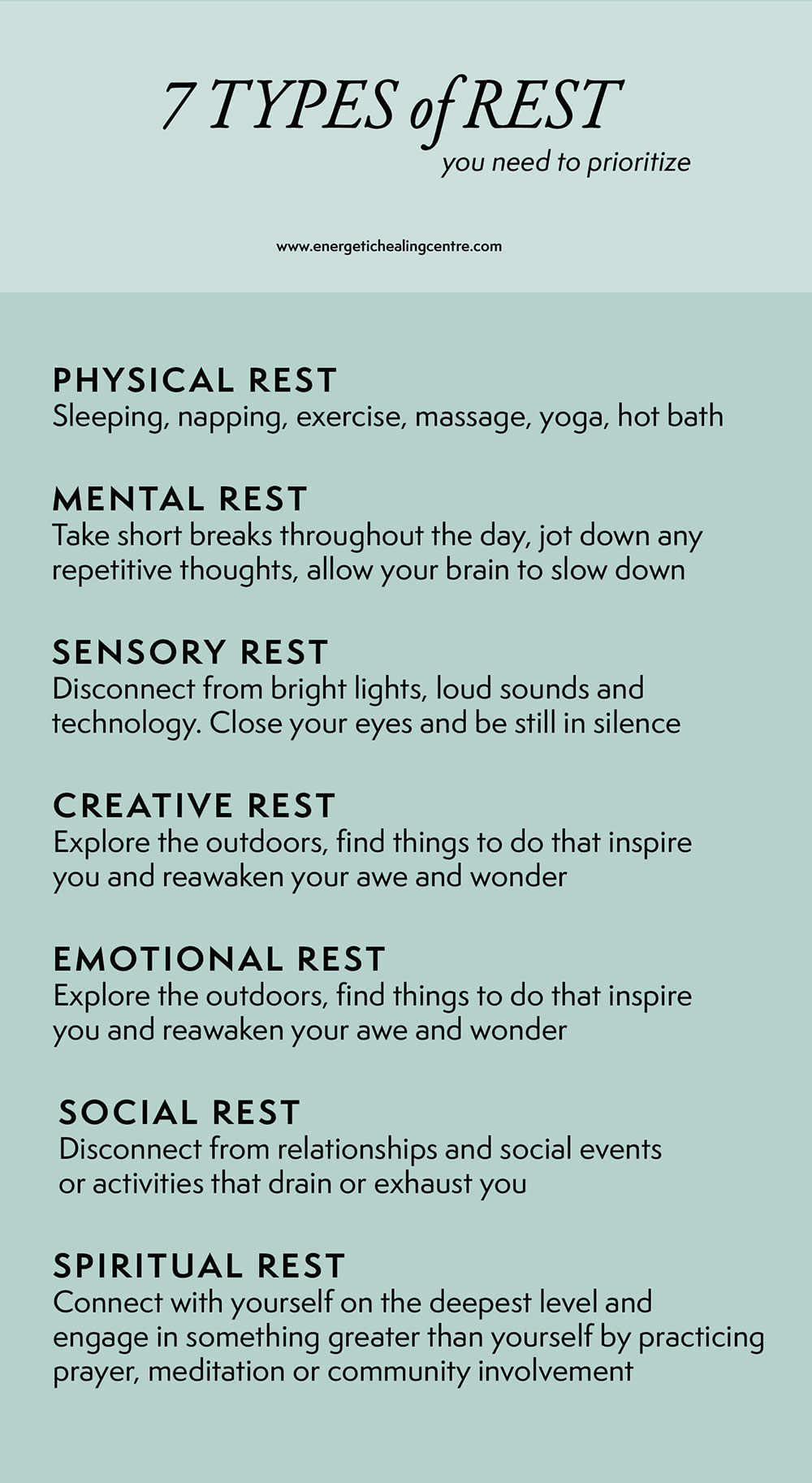Rest and relaxation is a vital part of a healthy and balanced lifestyle. It’s essential to be able to completely unplug from all of your responsibilities, demands and pressures so you can refill your cup and live your life feeling refreshed and rejuvenated.
In today’s modern, fast paced world, being “too busy” to rest and relax is a common phrase you hear people say but the reality is that your body is not a machine, it can only go on so long.. pushing, racing around and running on fumes. Just like your car needs to be refueled and your devices need to be recharged, so do you. It’s not a luxury, it’s a necessity.
What is Resting?
Definition: To cease work or movement in order to relax, refresh oneself, or recover strength.
There are several types of rest that you may be in desperate need of. Try starting with one or two that call to you, so you can slowly ease into restoring your mind, body and spirit.
Physical
Sleeping, napping, exercise, massage, yoga, hot bath
Mental
Take short breaks throughout the day, jot down any repetitive thoughts, allow your brain to slow down
Sensory
Disconnect from bright lights, loud sounds and technology. Close your eyes and be still in silence
Creative
Explore the outdoors, find things to do that inspire you and reawaken your awe and wonder
Emotional
Express yourself authentically to others and/or by journaling, maintain boundaries regarding people pleasing and caregiving
Social
Disconnect from relationships and social events or activities that drain or exhaust you
Spiritual
Connect with yourself on the deepest level and engage in something greater than yourself by practicing prayer, meditation or community involvement
What is Relaxing?
Definition: To reduce tension or anxiety
Our body and mind gets very tense when we experience stress. Symptoms include persistent thoughts and worries or chronic aches and pains. Relaxing reduces these symptoms so you can feel calm and centered.
10 Ways to Practice Relaxation
- Guided meditation (try mine here)
- Body scan (try mine here)
- Progressive muscle relaxation (try mine here)
- Breathing techniques
- Exercise
- Yoga
- Hypnosis
- Massage therapy/bodywork (check out my services here)
- Visualization/guided Imagery
- Music/art therapy
Why can it be hard to rest and relax?
Chronic stress, anxiety and overstimulation can make it really challenging to shift gears from overdrive to rest and relaxation. Not to mention the constant pressure to always be productive or the core belief that you need to earn or deserve the time to rest and relax.
When you do allow yourself to take a break, you may lay down to rest your eyes and slow down, but you find your mind is still racing with thoughts, which can be discouraging, especially if you only have so much time carved out for it. A helpful tip to understand about our body is that the sympathetic nervous system is connected to our stress response (fight, flight, freeze, fawn) which acts very quickly and the parasympathetic nervous system is connected to our relaxation response which engages more slowly. Which means it can take time to relax your mind, especially if it’s been very active and overstimulated. Your relaxation response kicks in when you feel safe, so be patient as you transition into rest mode.
This also trickles into the ability to get a proper night’s sleep. Rest and relaxation plays an important role in sleep. If you’re going, going, going all day long, sure you’re going to be exhausted by the end of the day.
But are you able to shift gears and move into sleep mode? When you take small breaks throughout the day to rest and relax, it’s like you’re training your body and mind to know how to relax. So when it comes time to go to sleep, you can more easily shift gears to fall asleep and stay asleep.
“The paradox of relaxation is the renewal of the mind, rekindling of spirit, and revitalizing of strength” – Lailah Gifty Akita
I also want to mention the activities we engage in that may not be the best options. Many people tend to overdo it on their quest for rest and relaxation, only resulting in draining themselves even more. What you think is resting and relaxing may not be the healthiest choice for you. Here’s what I mean:
10 Unhealthy Ways to Rest & Relax
- Drinking too much alcohol
- Taking drugs
- Smoking cigarettes
- Overeating/comfort eating
- Oversleeping
- Too much time alone/isolation
- Too much screen time/technology (binge watching and scrolling)
- Excessive workouts
- Excessive caffeine
- A sedentary lifestyle
10 Benefits of R&R:
- Improves sleep
- Pain relief/reduces inflammation
- Increases concentration and productivity
- Renews energy and motivation
- Helps with a healthier immune system
- Improves mental clarity
- Boosts mood and emotions
- Reduces stress and anxiety
- Prevents burnout and exhaustion
- Better coping skills
Chronic stress and anxiety impacts our health in detrimental ways. The consequences of not managing it in healthy ways can be dire. Our body speaks to us all the time. It lets us know when we’re hungry, thirsty, tired, achy and more. Don’t wait for your body to scream at you that it needs help. Rest and relaxation restores, rejuvenates, replenishes and recharges you so you can live your best life. Integrating restful and relaxing practices into your daily life will help your mental, emotional, physical and spiritual wellbeing. If you’re moving through life constantly drained and depleted, then something is out of balance and it’s important to figure out what that is. It’s important to find the ways that work for you. Make it a priority to listen to your body and take short breaks throughout the day so you can not only manage stress but prevent it.


